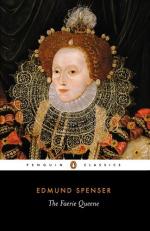Dame Coelia[*] men did her call, as thought
From heaven to come, or thither to arise,
The mother of three daughters, well upbrought
30
In goodly thewes, and godly exercise:
The eldest two, most sober, chast, and
wise,
Fidelia[*] and Speranza virgins were,
Though spousd, yet wanting wedlocks solemnize:
But faire Charissa[*] to a lovely fere
35
Was lincked, and by him had many pledges dere.
V
Arrived there, the dore they find fast lockt;
For it was warely watched night and day,
For feare of many foes: but when
they knockt,
The Porter opened unto them streight way:
40
He was an aged syre, all hory gray,
With lookes full lowly cast, and gate
full slow,
Wont on a staffe his feeble steps to stay,
Hight Humilta.[*] They passe in stouping
low;
For streight and narrow was the way which he did show.
45
VI
Each goodly thing is hardest to begin,
But entred in a spacious court they see,
Both plaine, and pleasant to be walked
in,
Where them does meete a francklin faire
and free,
And entertaines with comely courteous
glee, 50
His name was Zele, that him right well
became,
For in his speeches and behaviour hee
Did labour lively to expresse the same,
And gladly did them guide, till to the Hall they came.
VII
There fairely them receives a gentle Squire,
55
Of milde demeanure, and rare courtesie,
Right cleanly clad in comely sad attire;
In word and deede that shew’d great
modestie,
And knew his good[*] to all of each degree,
Hight Reverence. He them with speeches
meet 60
Does faire entreat; no courting nicetie,
But simple true, and eke unfained sweet,
As might become a Squire so great persons to greet.
VIII
And afterwards them to his Dame he leades,
That aged Dame, the Ladie of the place:
65
Who all this while was busy at her beades:
Which doen, she up arose with seemely
grace,
And toward them full matronely did pace.
Where when that fairest Una she beheld,
Whom well she knew to spring from heavenly
race, 70
Her hart with joy unwonted inly sweld,
As feeling wondrous comfort in her weaker eld.
IX
And her embracing said, O happie earth,
Whereon thy innocent feet doe ever tread,
Most vertuous virgin borne of heavenly
berth, 75
That, to redeeme thy woefull parents head,
From tyrans rage, and ever dying dread,[*]
Hast wandred through the world now long
a day;[*]
Yet ceasest not thy weary soles to lead,[*]
What grace hath thee now hither brought
this way? 80
Or doen thy feeble feet unweeting hither stray?




